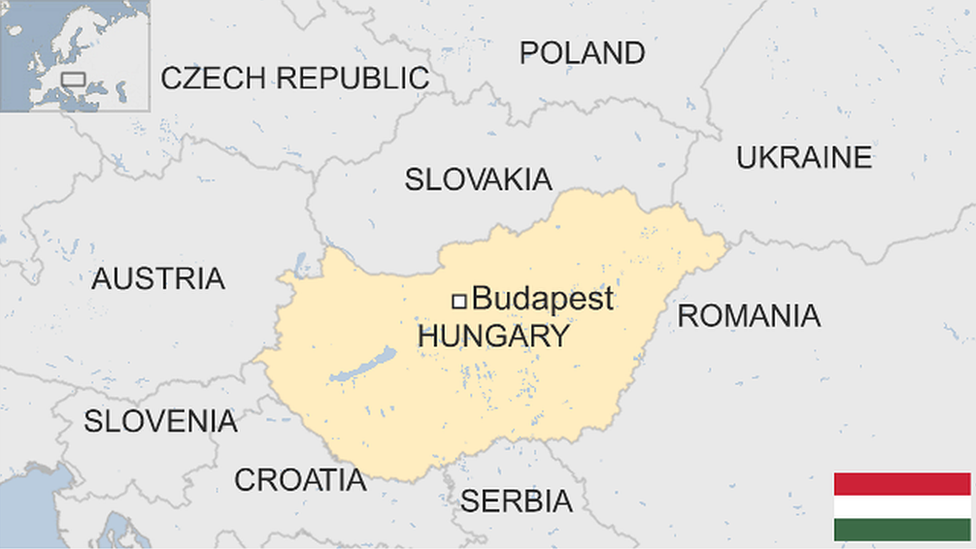Hungary election: Viktor Orban's hold on the voters
- Published
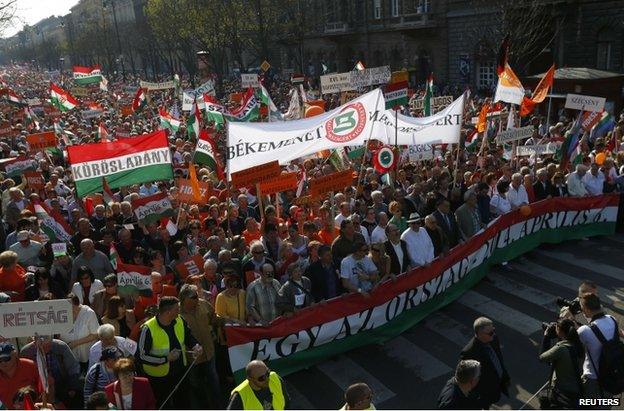
Fidesz supporters held a march through Budapest last week
Polls suggest Hungary's governing Fidesz party is set to win another two-thirds majority at Sunday's general election.
Opposition leader Gordon Bajnai never once raises his voice, despite the roar of the crowd behind him.
In the face of the opinion polls, he insists: "We are flying blind in these elections. Opinion polls were invented for normal democracies. If democracy becomes limited, then surveys are of limited value too."
As leader of Together 2014, a centrist opposition movement, he is running in these elections as part of an uneasy coalition of leftist, liberal and green parties, trying to oust the popular and populist Prime Minister, Viktor Orban. His last hope is that the many people fed up with Mr Orban will find just enough in the opposition programme to vote for.
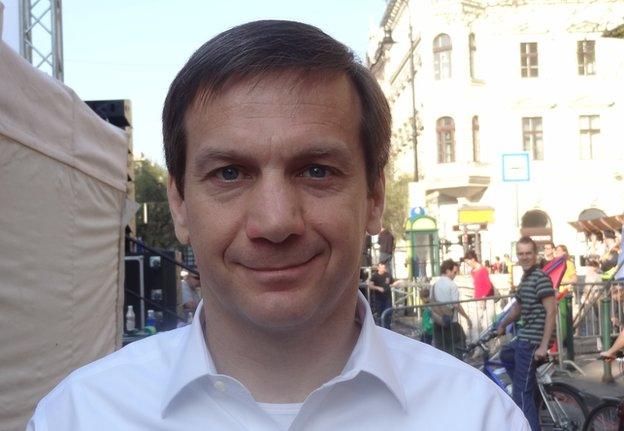
Gordon Bajnai says the opinion polls should not be believed
Mr Bajnai's vision of Mr Orban's Hungary is a dark one of a country
where state prosecutors leak investigations of opposition politicians to the pro-government media in order to hurt their chances in the run-up to elections
where teachers and other public servants live in fear for their jobs if they speak out against root-and-branch educational reforms, which have made their lives extremely difficult
where the opposition struggles to get its message across through public service radio and television, and even commercial media are dominated by Mr Orban's propagandists
which has lost hundreds of thousands of well-qualified young people to emigration
and where, worst of all, Mr Orban's handshake with Russian President Vladimir Putin in January means commitment to an ill-conceived nuclear expansion - a radioactive stone around the necks of future generations of Hungarians.
Single message
Ferenc Kumin looks out from his first-floor window in the south wing of the Hungarian parliament onto a very different Hungary.
As spokesman of the Fidesz government, he is inordinately proud of the vast, newly landscaped square, of the new metro line under the city (begun by the liberals, completed by Fidesz) but above all by his government's record in office.
"Hungary is performing better!" is the message plastered on the country's buses, trams and roadside billboards for the past months - long before the election campaign started.
Mr Kumin has the figures to prove it:
a growth rate of 2.7%
inflation below 2%
unemployment below 9%
a foreign trade surplus of over 7bn euros (£5.8bn; $9.6bn) in 2013.
Viktor Orban has decided not to publish a party programme for this election, preferring the simpler message: "We cut utility bills".
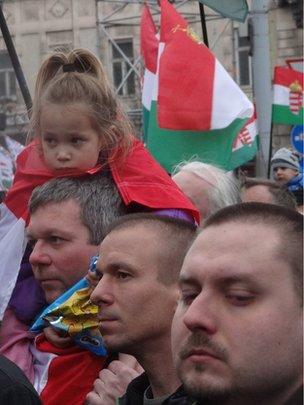
Radical nationalists Jobbik are aiming to win 20%
A swingeing 30% cut in gas bills has proven rather popular with consumers.
The opposition says Hungary's 27% value added tax - the highest in Europe - harms their standard of living far more.
Mr Kumin rebuts Gordon Bajnai's allegations one by one. Democracy is alive and well in Hungary, he insists. The main criticisms by European institutions of the media law and the new constitution were addressed with amendments.
All parties agreed that Hungary needed a smaller, more streamlined parliament, and that is what has been achieved - without gerrymandering, he says.
The cuts in utility bills, he says, are part of the Fidesz philosophy to stand up for households against big businesses which overcharge consumers. And the big loan from Russia to build new nuclear reactors, he believes, will make it possible to keep electricity prices down.
Budapest does look beautiful in the spring sunshine. Tourists flock here in ever greater numbers. Cruise liners plough the River Danube. The newly paved area around the parliament building lacks trees but is otherwise impeccable. An army of street sweepers swoops on each chocolate wrapper before it hits the ground.
Japanese tourists flock enthusiastically to watch the raising of the Hungarian flag each morning and its lowering at dusk. The new metro station at Kalvin Square is a science-fiction extravaganza. Gellert Square, a marvel of mosaics.
Pro-Russian mood
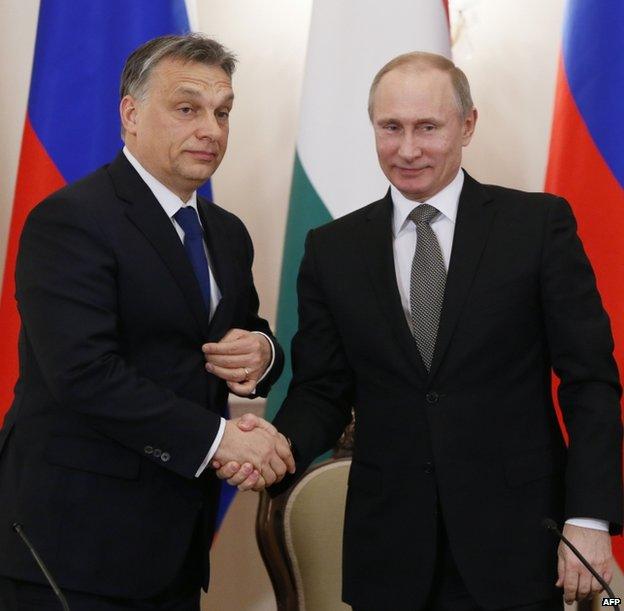
Viktor Orban (left) shaking hands with Vladimir Putin in January
At least 150,000 (pro-government media said 500,000) government supporters turned out for the final Fidesz rally in Heroes Square to hear Viktor Orban exhort the faithful. This is nothing less than a love affair with a charismatic leader for whom the centrist opposition has no answer.
Only the radical nationalist Jobbik party outdoes Viktor Orban with its promise to defend Hungary from interference from Brussels. Jobbik shares Viktor Orban's conversion to nuclear energy, but combines it with a pro-Russian rhetoric not heard in Hungary since the early 1950s.
According to Jobbik MP Marton Gyongyosi, the recent referendum in Crimea on leaving Ukraine was a model of self-determination. But he firmly denies allegations that his party is partly financed by Russian state or private sources.
While Jobbik hopes to swell its 16.7% score four years ago to over 20% this time, Hungary's main Green Party, LMP, which stands for Politics Can Be Different, is struggling to cross the 5% threshold needed to remain in parliament.
The increasingly crude mud-slinging between Fidesz and the centrist bloc in the last days of the campaign could boost votes for both Jobbik and the LMP.
- Published6 February 2014
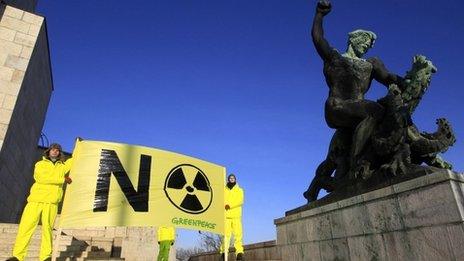
- Published23 December 2013

- Published23 October 2013
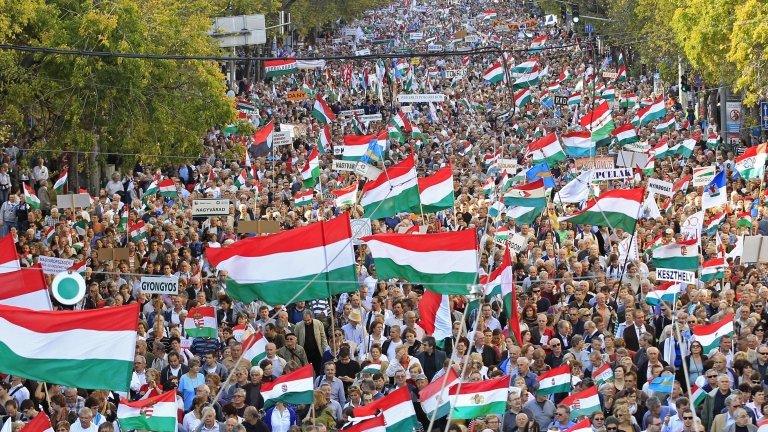
- Published25 April 2013
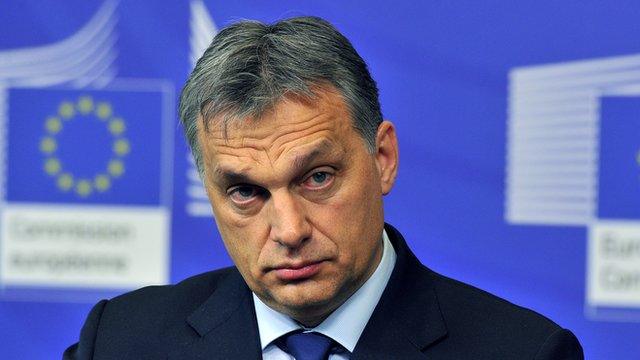
- Published11 March 2013
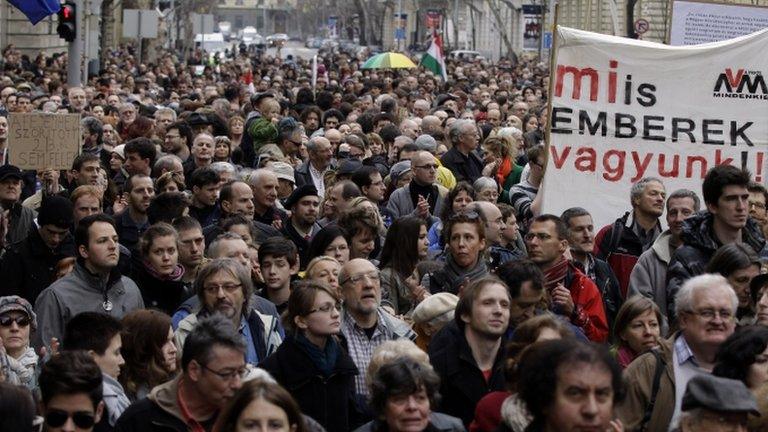
- Published4 June 2024
